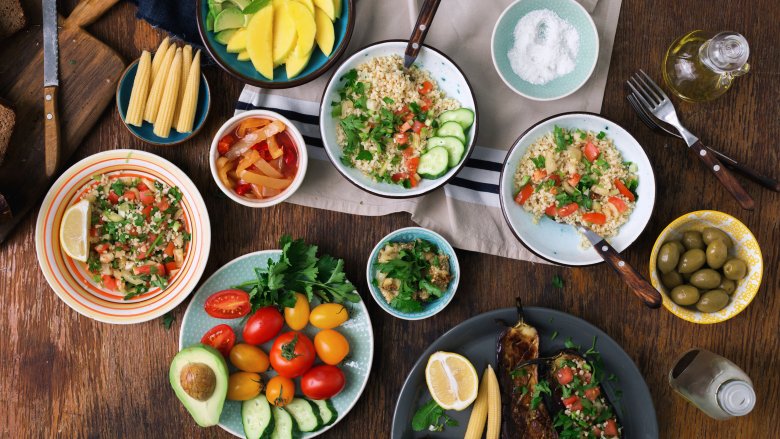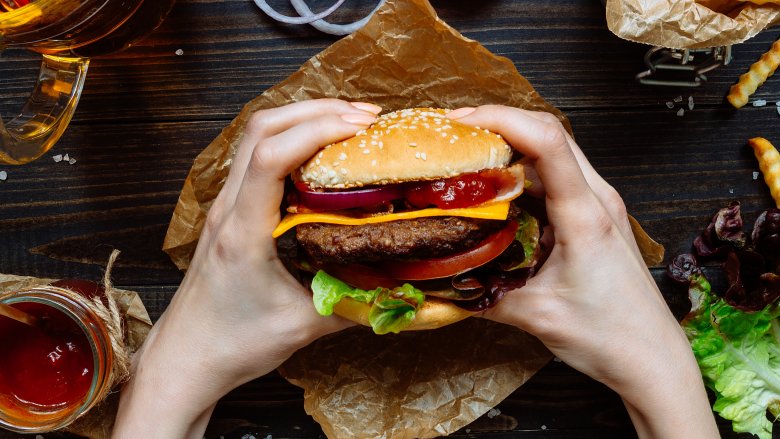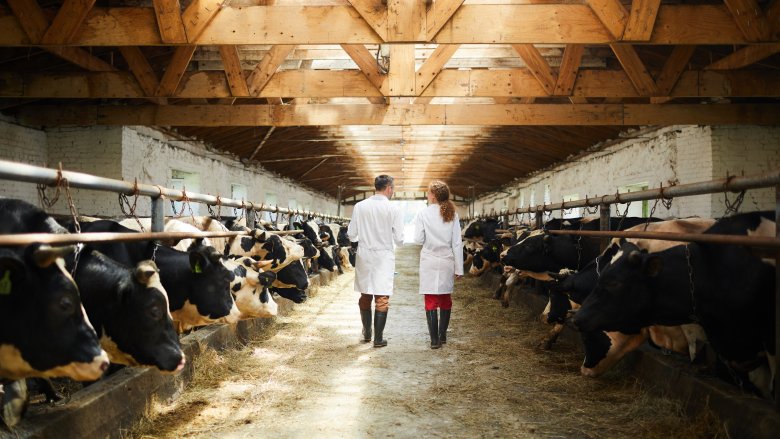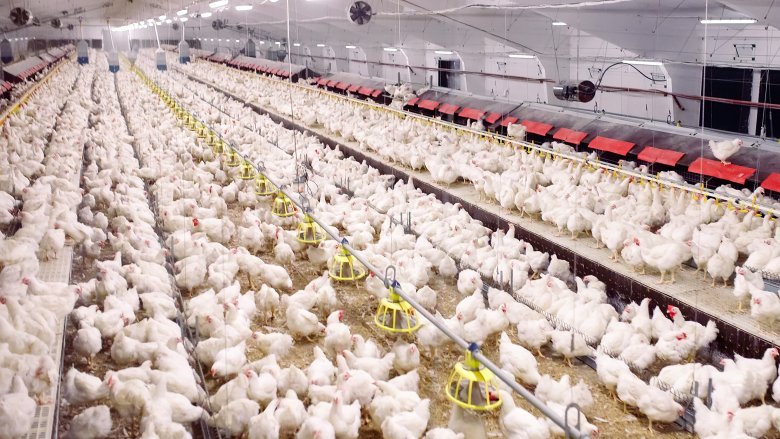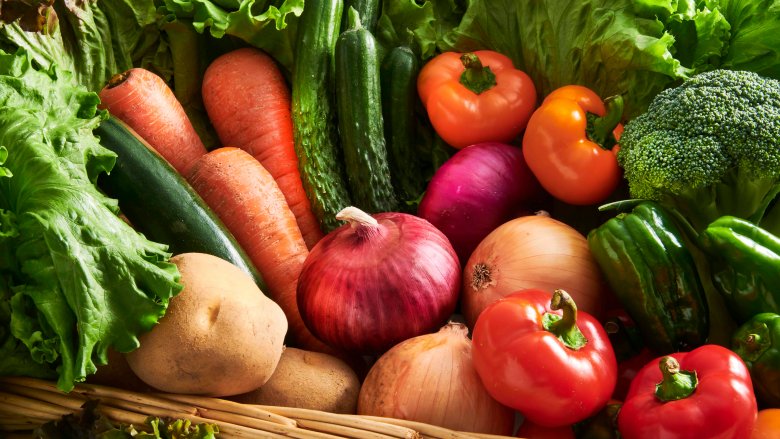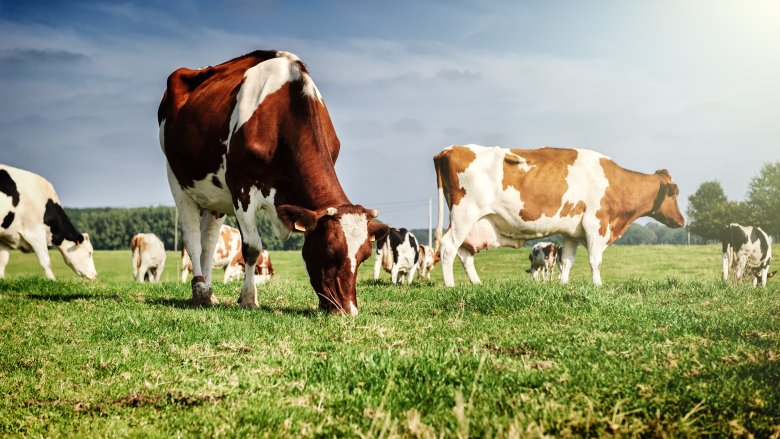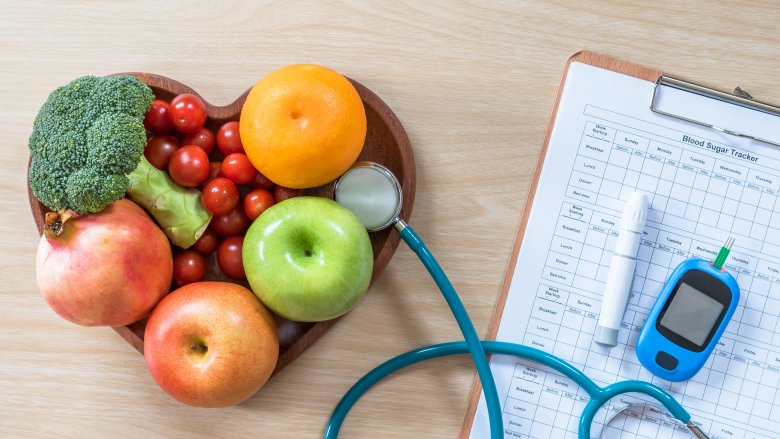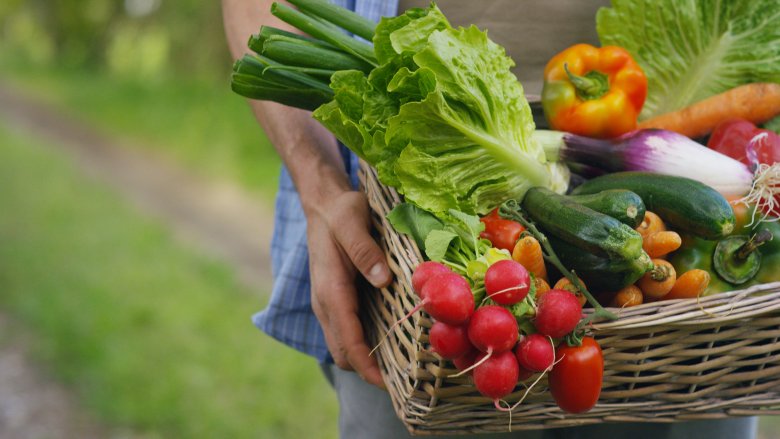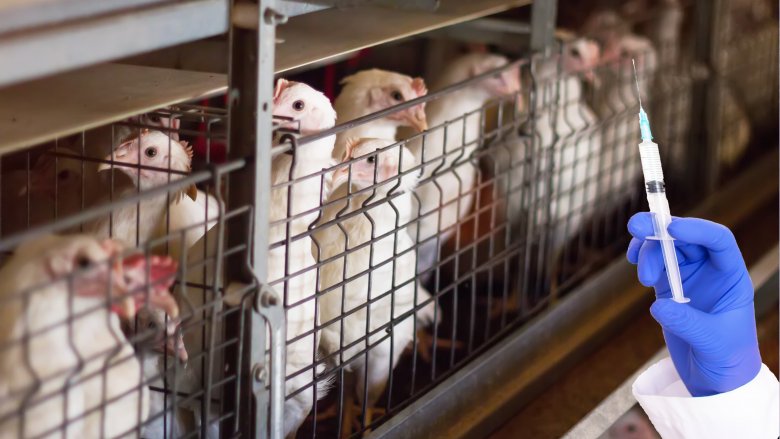Reasons To Go Vegetarian In 2019
Once upon a time, vegetarianism was a taboo term at the dinner table. And if you go way back to when our ancestors had to hunt and food was scarce, eating meat was a necessity for survival. Thanks to the agricultural revolution and the advanced technology of today, meat is a commodity and consuming meat is a lifestyle choice. With growing health problems like obesity and heart disease, vegetarianism is gaining more popularity for its health benefits.
It seems everywhere you go, there's a vegetarian option to accommodate this stride towards healthier living. Even celebrities like Natalie Portman and Jared Leto have turned to a plant-based diet, and many more people are converting each day. Whether a person turns to vegetarianism because they watched a PETA video or because they're simply looking to shed a few pounds, the health benefits stay the same. If you previously thought it was way too hard to make the veg plunge, 2019 may be your year. The change has never been easier, or tastier, than it is today, and when it comes to motivation, there are many good reasons to adopt a vegetarian lifestyle.
That burger contains harmful bacteria
A juicy hamburger may sound mouthwatering to most, but knowing that you're consuming harmful bacteria in each bite could ruin the appetite of any carnivore. Consumer Reports studied 458 pounds of ground beef from over 103 grocery stores across the United States. Purchasing the beef from both large grocery stores and small natural food hubs, it was tested for five different strains of bacteria. The results were eye-opening.
Every single pound of beef contained bacteria linked to fecal contamination, which can cause urinary tract infections or blood-related infections. Nearly 20 percent of the beef tested positive for the bacteria responsible for almost one million cases of food poisoning every year. Ten percent of the beef contained a strain of bacteria that sometimes produces a toxin that, even once cooked, can still make you terribly sick. It may not sound like a lot, but one percent of the beef contained salmonella — a bacteria that infects your intestines and can result in death.
That said, Consumer Reports found that sustainably raised beef contained about half the amount of superbug contamination as opposed to conventionally raised beef. So if you love your meat and can't give it up, it appears to be worth splurging on burgers. Or, this could be the motivation you need to swap out your beef patty for a veggie burger once and for all.
Meat is killing our environment
Climate change is no joke. NASA explains global warming is rapidly increasing and is the result of our lifestyle since the mid-20th century. We've seen changes, for the worse, in Mother Earth like the global temperate spike, the rise in sea level, and higher acidity in the ocean. Greenhouse gases coming from agriculture are partially to blame for these changes. But not all foods emit the same amount of greenhouse gases.
The Environmental Working Group found that beef production emits over ten times more greenhouse gases than most vegetables and plant-based foods. Most of the beef industry's greenhouse gas emissions come from the animal's waste, while a large amount is the result of the agricultural means needed to feed them. And we're not talking a little bit of food here and there. We're talking an average of 30 pounds of hay a day per cow. That's a lot of food to be fed to a cow who's going to be slaughtered anyway.
A report published by the World Resources Institute explains that eating less meat could reduce greenhouse gas emissions by 15-35 percent, and adopting a vegetarian diet could drastically lower it even more.
Your skin will thank you
It seems everywhere you look, influencers and advertisers are promoting new skincare products and there's a good reason why. Skincare is one of the fastest growing industries and increased by a remarkable 13 percent in 2018. But products can't fix all skin problems and ignore an important factor in your skin's health — diet.
A skin color study conducted by David Perrett followed 35 caucasian subjects for six weeks and instructed them to eat more or fewer servings of fruits and veggies. The group that consumed more fruits and veggies experienced an increase in skin tone with what was described as a healthy golden glow. The group that consumed fewer servings of fruits and veggies, on the other hand, saw the opposite effect: a dull skin tone. The researchers even found that as little as two additional servings of fruits and veggies a day offered a noticeable change in skin color. That's a pretty significant skin improvement that was revealed in as little as two months. That golden goddess glow is possible, after all, and it's found at your nearest grocery store. Stock up on those fruits and veggies!
Many chickens die a slow painful death
Many Americans are aware of the inhumanity that can be found in slaughterhouses, but some still choose to look the other way. The mere concept of grouping hundreds, if not thousands, of living chickens in a small space only to kill them is a horrific one. Yet this is a dark part of our society's behavior due to the mass consumption of poultry.
There are laws to reduce the pain and suffering chickens experience when slaughtered like the use of stunning — electrocuting animals into unconsciousness. However, scientists have found (via HuffPost) that many farmers' chosen method of low-voltage stunning doesn't effectively put the bird into an unconscious state. This leads to an estimated 90 million chickens to die painfully awake.
It seems the U.S. legislation is well aware of this problem, but hasn't done much to improve the situation. Steve Wotton, a researcher at the University of Bristol's School of Veterinary Sciences, addressed this problem to HuffPost, "The U.S. settings that have been reported to me and that I've read in published papers are far too low to stun."
Significantly lower your cancer risk
Cancer is one of the leading causes of death in America. Devastatingly, it seems we all have known someone who's had cancer or lost someone to the disease. While most people think cancer is unpreventable, 30 percent of cancers in Western countries are connected to dietary factors. Yessenia Tantamango-Bartley studied the dietary intake and the occurrence of cancer in 69,120 participants. By filling out a dietary questionnaire, the participants detailed the specifics of their food intake and the serving size consumed. They were also required to have a health exam after four years to detect any signs of cancer.
This study found less cancer incidents in patients who followed a vegetarian diet and even fewer — particularly female-specific cancers — in those who were vegan. This may be explained by vegetarians' likeliness to consume more fruits and vegetables than other diet groups. Containing more fibers and antioxidants, plant-based foods are correlated with a lower risk of cancer. Vegetarians, who are already making a positive change to their health, are believed to bring other healthy changes into their lives, like exercise, which can also play an important role in lowering cancer risk.
Say no to obesity
America, the land of the brave and the home of the free. The nation known for supersizing meals, stress eating, and celebrating whatever we can with barbecue and lots of beer. A lifestyle like this does not end well and we're seeing the effects of it with one rising health concern. You guessed it, obesity.
According to the Center For Disease Control and Prevention, obesity impacted 39 percent of Americans in 2015-2016. But this deadly epidemic could be improved with some simple dietary changes. A ten-year study conducted by the University of Navarra in Spain proved that reducing, or better yet, completely removing meat from your diet can lower your risk of obesity by 43 percent. This isn't the first time vegetarianism has shown its miraculous wonders for weight loss.
A team of researchers from the Physicians Committee For Responsible Medicine in Washington D.C. found that diabetic subjects who followed a vegetarian diet lost twice as much weight as those who followed a carnivorous diet. Dr. Hana Kahleová explained of his findings (via Science Daily), "we also showed that a vegetarian diet is much more effective at reducing muscle fat, thus improving metabolism."
Benefits in the bedroom
PETA is known for launching campaigns that promote how a plant-based diet can boost your sex life and how consuming meat can hinder it. This was shown in 2017 when a series of ads depicted a cow laying between a couple in bed with the slogan, "Meat interrupts your sex life." But how exactly does it affect us between the sheets? Meats are high in cholesterol, which can can lead to heart problems, poor circulation, and erectile dysfunction. The Massachusetts Male Aging Study suggests consuming less meat and eating more natural foods is best for sustaining erections. Participants in this study who consumed natural foods reduced the instance of erectile dysfunction (via Healthline). A win for all!
It's also important to note that many fruits and vegetables have libido-enhancing benefits. Foods like strawberries are packed with antioxidants which encourage healthy blood circulation vital for sexual function in males and females. High in phytonutrients and L-citrulline, watermelon promotes Viagra-like blood flow to your blood vessels which can ramp up sex drive.
Cows have feelings, too
It's easy to think of cows as grass-grazing animals without a care in the world, nor much brain power. However, cows have more advanced emotional states than most people would think. An experiment conducted by Kristin Hagen and Donald M Broom measured the emotional reactions of cattle when learning something new. They broke the cattle into two groups — the first group was taught to open a gate which led to a reward of food. The second group was simply just given the food reward. The scientists also measured the cow's heart rates and speed in which they moved towards the food reward. The cows who were taught to open the gate moved faster towards the food and had faster heart rates. This concluded that cattle respond emotionally to their learning advancements.
Another essay, The Psychology of Cows, expresses cows' ability to discriminate towards people who have exposed roughness towards them. "Calves as well as adult cows show learned fear responses to humans who have previously handled them in a rough manner," wrote Lori Marino and Kristin Allen. Understanding that cows embody emotions, just like us, can make it harder to justify killing them.
You'll feel better emotionally
Everyone wants to feel good, and rightfully so. Mental health is an incredibly important factor in you work life, relationships, and personal successes. A happy mood makes your world go round. And a vegetarian diet can help you get there. You've probably heard of the health benefits of a vegetarian diet but perhaps its mood-boosting qualities are even more appealing.
A study published by Bonnie L Beezhold in Nutrition Journal had participants conform to one of three diets: vegetarian, pescatarian or carnivore. The participants were required to take two tests measuring mental health. Beezhold found that omnivores had significantly improved emotional states after following a vegetarian diet for only two weeks, while the other two groups' emotional states remained unchanged. So what exactly is responsible for this change? Omnivores have higher levels of arachidonic acid, which is correlated with depression. If you're looking to improve your mood, adopting a vegetarian diet can be a more cost-efficient first step than trying prescriptions or therapy right off the bat.
You may dodge type 2 diabetes
Type 2 diabetes affects approximately 29.1 million Americans according to Healthline. The condition is incurable and patients living with it must carefully watch what they eat and draw blood from their finger daily to monitor glucose levels. There's a fairly easy way to lower your risk of getting type 2 diabetes that most people don't know about. Judging by the title of this article, you can probably guess what it is.
Ambika Satija and her team of researchers analyzed data from over 200,000 health professionals and studied the influence of a vegetarian diet on type 2 diabetes. She concluded that a vegetarian diet can reduce the risk of type 2 diabetes by 20 percent. They even broke down the vegetarian diets and separated them into various groups, identifying some versions of the diet to be healthier than others. She found that the healthiest version of a plant-based diet can reduce your diabetes risk, even more, by nearly 34 percent. If you want to lower your risk, adopting a vegetarian diet may be just what you need to dodge the life-threatening disease completely.
Save more moolah
The health food industry is soaring at an all-time high. The organic food industry reached a worth of 45.2 billion dollars in 2017, and as a result we are constantly bombarded with health-conscious products from organic produce to vitamins and supplements. Unfortunately, most Americans think that healthier food will break the bank and settle for more affordable, conventionally raised options. But sticking to the simplicity of produce that often comes with a vegetarian diet can save you more money, while also providing many health benefits.
Studies show that besides the health, environmental and moral benefits of a vegetarian lifestyle, eating a plant-based diet can also have attractive advantages for your wallet. A study in the Journal of Hunger & Environmental Nutrition calculated that vegetarians save at least $750 per year compared to carnivores. The study compared government-recommended meal plans made up of a variety of items (including meat) with a strictly vegetarian counterpart. Both meal plans were based on an intake of 2000 calories per day and prices were calculated using the cheapest brands available at Stop & Shop grocery stores.
Lower your cholesterol and live longer
According to the Centers for Disease Control and Prevention, heart attacks are one of the most common killers and are responsible for 25 percent of American deaths. High cholesterol is one of the main triggers of a heart attack and is fueled by high fat intake that is often found in meat, greasy fast food, and baked goods. One of the key factors in high cholesterol is spiked concentration levels of low-density lipoprotein (LDL), otherwise known as "bad cholesterol" in your bloodstream.
According to a study published in 2017 in Nutrition Reviews, a vegetarian diet was found to significantly lower the chance of heart attack by reducing LDL levels. These results proved that a plant-based diet can decrease "bad cholesterol" from 15-30 percent in comparison to omnivorous diets. This study shows evidence that eating your veggies can really pay off and help you live a longer, heart-healthy life.
Antibiotic resistance kills
Antibiotics have become a vital part of survival by curing diseases like syphilis, tuberculosis, and pneumonia. Unfortunately, antibiotics started doing more harm than good when farmers began pumping them into livestock to transform feed into money faster. This practice has only increased as farmers sought to stuff greater numbers of livestock into barns, making antibiotics a necessity to protect chickens from diseases that arise from poor living conditions. But, as The Guardian reported, there have been dire consequences; as we eat these antibiotic-packed animals, we are seeing a spike in human resistance to the same antibiotics that we depend on to survive.
According to The Guardian, 700,000 deaths worldwide are caused by antibiotic resistance disease. Most people don't even know that antibiotic resistance exists until they, or someone they know, comes into contact with it. We should ask ourselves if this level of mortality is worth the benefits of increased profits within the poultry industry thanks to the use of antibiotics. While effecting change in the industry is worthwhile, in the meantime it may be worth reconsidering consuming these animal products altogether. Perhaps it's time to minimize our meat consumption and move towards a healthier, plant-based approach.
2019 makes it easier than ever before
Years ago, pursuing a vegetarian diet would have been hard to achieve, but these days it's a piece of cake — vegan cake, if you must. The internet is packed with endless vegetarian resources overflowing with tasty meatless recipes that even carnivores would enjoy. Not to mention, restaurants and grocery stores across the country have a variety of creative plant-based proteins from Quorn's Chik'n Tenders to Beyond Meat's Hot Italian Sausages. If you thought that fast food was out of the question for vegetarians, you'll be pleasantly surprised. Carl's Jr. has a Beyond Burger (made with a Beyond Meat patty), Taco Bell has, well, everything (just replace meat with beans and/or potatoes in any meal), and even White Castle has a vegan slider.
Vegetarians know that it's sometimes hard to tell if a food is actually meat-free. That's when an app like Is It Vegan? comes to save the day. This app tells you whether an item is vegetarian or vegan so there are no more unpleasant surprises. Another app, called Protein Tracker, helps veg heads ensure they are consuming enough protein. If this isn't proof that times have changed and meat-free living is easier than ever, we don't know what is!
